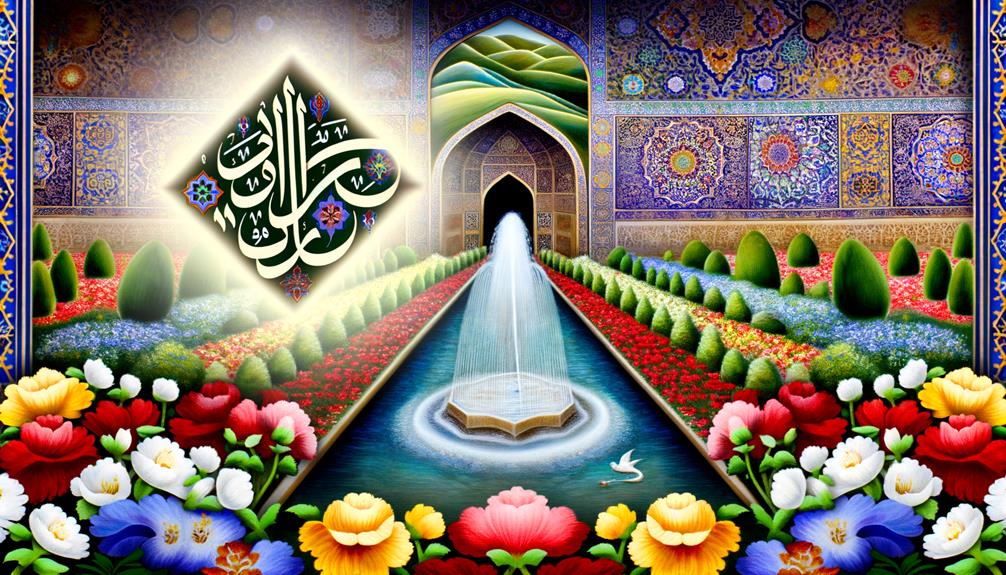Zahir Name Meaning in Islam
'Zahir' in Islam originates from Arabic, meaning 'manifest,' 'evident,' or 'clear.' It bears profound linguistic and cultural significance, representing the visible and apparent nature of God's attributes. Historically, it traces back to Quranic references and Hadith literature, embodying the omnipresence and apparent nature of the Divine.
This name underscores Allah's pervasive presence and inspires believers to acknowledge His evident signs in creation. The cultural impact of 'Zahir' extends into literature, art, and social customs, reflecting clarity and transparency.
For a deeper understanding of how this name influences Islamic teachings and cultural expressions, further exploration is encouraged.

Key Takeaways
- Zahir means 'manifest,' 'evident,' or 'clear' in Arabic.
- It is one of the 99 Names of Allah, symbolizing God's omnipresence and manifest nature.
- The term reflects the visible and apparent aspects of God's attributes.
- Zahir signifies Divine Presence, encouraging believers to seek strength and guidance from it.
- It holds enduring cultural and spiritual significance in Islamic literature, art, and social customs.
Etymology of Zahir
Derived from Arabic roots, the name Zahir holds profound linguistic and cultural significance within Islamic tradition. Etymologically, Zahir translates to 'manifest,' 'evident,' or 'clear,' reflecting its foundational role in the Arabic language.
This term is deeply embedded in Islamic theology, symbolizing the visible and apparent nature of God's attributes. The word itself is derived from the triliteral root Z-H-R, which encapsulates meanings related to visibility and clarity.
Beyond its literal sense, Zahir also resonates with philosophical and spiritual dimensions, indicating the manifest aspects of divine presence. In Islamic nomenclature, names like Zahir are chosen not merely for their phonetic appeal but for their ability to convey profound spiritual meanings and theological principles.
Historical Context
The name Zahir holds profound significance within Islamic tradition, with its origins rooted in early Quranic references and Hadith literature.
Historical texts reveal the name's enduring presence, reflecting its cultural and spiritual importance over centuries.
Origins in Islamic Tradition
Islamic tradition imbues the name Zahir with profound significance, reflecting its rich historical and theological roots. The name Zahir, derived from the Arabic root 'Ẓ-H-R,' means 'evident' or 'manifest.' In addition to its evident meaning, the name Zahir is often associated with qualities such as clarity, brightness, and truthfulness in Islamic tradition. It resonates with the values of integrity and transparency, making it a meaningful choice for many. Moreover, understanding the zaria name significance in islam offers insights into how names can embody spiritual aspirations and moral virtues.
Within Islamic thought, it signifies the visible, apparent, and clear aspects of existence, often juxtaposed with 'Batin,' which denotes the hidden or esoteric. This duality underscores a fundamental Islamic belief in the balance between the seen and unseen domains.
Theologically, Zahir is one of the 99 names (Asma'ul Husna) attributed to Allah, encapsulating His attribute of being evident in creation. Historically, the name has been adopted by various individuals, signifying its entrenched presence in Islamic culture and its alignment with core Islamic principles.
Early Islamic References
Early Islamic texts and scholarly works frequently reference the name Zahir, illustrating its integral role in the religious and cultural lexicon of the time. The term "Zahir" often appears in theological discussions and Quranic exegeses, emphasizing its diverse applications and significant meanings. It is used to denote the apparent and manifest aspects of God's attributes, contrasting with "Batin," which refers to the hidden or esoteric aspects. This duality enriches Islamic thought, providing a nuanced understanding of the divine.
| Text/Source | Reference to Zahir |
|---|---|
| Quran | Attributes of God |
| Hadith | Manifest qualities |
| Tafsir Works | Exegesis interpretations |
| Early Islamic Poetry | Symbolism and analogy |
| Sufi Literature | Spiritual and metaphysical |
This table highlights the multifaceted presence of Zahir in various Islamic contexts.
Cultural Significance Over Time
Building upon its theological significance, the name Zahir has also held considerable cultural importance throughout Islamic history, influencing various aspects of societal practices and artistic expressions.
Historically, the name Zahir has been prevalent among scholars, poets, and leaders, reflecting its esteemed status. In literature, it has been used to symbolize clarity and visibility, mirroring its meaning. The name's resonance is evident in historical texts, where it often denotes individuals who contributed to the intellectual and spiritual growth of their communities.
Moreover, Zahir has been a popular choice in naming conventions across the Islamic world, signifying the bearer's alignment with divine attributes. This cultural perpetuation underscores the name's enduring legacy and its multifaceted impact on Islamic civilization.
Spiritual Significance
The name Zahir holds profound spiritual significance in Islam, primarily representing the concept of Divine Presence as it connotes the apparent and manifest aspects of God's existence. This notion is intricately tied to the idea that believers can find inner strength and clarity through an awareness of this Divine Presence.
Consequently, the name Zahir serves as a reminder of the omnipresence of the divine, encouraging individuals to seek strength and guidance from this ever-present source.
Divine Presence Explained
Understanding the concept of divine presence in Islam requires delving into the spiritual significance of Allah's attributes, including the name 'Zahir.' 'Zahir,' meaning 'The Manifest,' signifies Allah's omnipresence and the evident nature of His existence. This attribute highlights that Allah's presence is not hidden but evident in the entire creation, reflecting His grandeur and supremacy.
The divine presence, as embodied by 'Zahir,' assures believers of Allah's continuous oversight and influence in the world, emphasizing that His existence is both clear and undeniable. Recognizing Allah as 'Zahir' encourages Muslims to perceive the divine in every aspect of life, fostering a deeper connection and consciousness of His all-encompassing presence.
This understanding enriches one's spiritual practice and devotion.
Inner Strength Manifestation
Recognizing Allah as 'Zahir' not only underscores His omnipresence but also inspires believers to manifest inner strength through unwavering faith and spiritual resilience.
The concept of 'Zahir' implies a divine visibility that reassures and fortifies the believer's soul. By understanding Allah's manifest nature, individuals are encouraged to cultivate inner fortitude, facing life's challenges with a sense of divine support.
This spiritual resilience is not merely about enduring hardships but thriving through them, knowing that Allah's presence is ever-apparent. As believers internalize this profound connection, their inner strength becomes a demonstration to their faith, enabling them to act with courage, patience, and unwavering trust in Allah's wisdom and guidance.
This dynamic interplay between divine manifestation and personal strength is pivotal in Islamic spirituality.
Cultural Impact
Zahir, as a name imbued with deep spiritual significance, has permeated various cultural arenas, influencing literature, art, and social customs within Islamic communities.
In literature, it often symbolizes clarity and visibility, concepts deeply rooted in its meaning. Writers and poets have employed Zahir to underscore themes of revelation and enlightenment.
In visual arts, it inspires motifs that emphasize transparency and inner truth, resonating with its essence.
Socially, the name Zahir is cherished, often chosen for its connotation of manifest strength and divine presence.
This cultural penetration underscores the name's multifaceted influence, reflecting its rich spiritual heritage and its enduring relevance in articulating values central to Islamic thought and community identity.
Zahir in the Quran
The profound cultural resonance of the name Zahir is additionally illuminated by its presence in the Quran, where it encapsulates the divine attribute of being manifest and evident.
Specifically, Zahir is one of the 99 Names of Allah (Asma'ul Husna), symbolizing God's omnipresence and manifest nature in the universe. This Quranic reference underscores the spiritual depth and theological significance attributed to the name.
It invites believers to recognize the omnipresent essence of the Divine, offering a lens through which they can perceive the world. It also emphasizes a divine transparency, suggesting that God's signs are evident in creation, fostering a sense of awe and reverence.
Consequently, the name Zahir carries a profound, multifaceted spiritual significance within Islamic theology.
Famous Namesakes
Among the notable individuals bearing the name Zahir are influential figures in various fields such as politics, literature, and academia, whose contributions have left a lasting impact on their respective domains.
These exceptional personalities include:
- Zahir al-Din Muhammad Babur: Founder of the Mughal Empire in India, an eminent historical figure.
- Zahir Raihan: Renowned Bangladeshi writer and filmmaker, celebrated for his literary works and cinematic contributions.
- Zahir Pajaziti: Prominent Albanian national hero, known for his role in the Kosovo Liberation Army.
- Zahir Shah: Last King of Afghanistan, remembered for his efforts in modernizing the country.
- Zahir Ebrahim: Distinguished scholar and author, contributing significantly to contemporary socio-political discourse.
These individuals exemplify the profound influence of the name Zahir across diverse spheres.
Modern Usage
Building on the legacy of historical and contemporary figures, the name Zahir continues to hold significant cultural and social relevance in modern times. In various Muslim communities globally, it remains a popular choice for its strong linguistic roots and profound meanings such as 'manifest' and 'bright.'
The name's appeal transcends generational shifts, resonating with parents seeking names that embody clarity and presence. Additionally, Zahir finds its place in literature, media, and academia, reinforcing its timeless allure.
In professional and personal spheres, individuals named Zahir often carry a sense of identity that is both culturally rich and universally respected. This way, Zahir's modern usage underscores its enduring significance and adaptability across diverse contexts.
Conclusion
To conclude, the name Zahir holds a deep etymological, historical, and spiritual significance within Islamic tradition.
While some may argue that its usage has diminished in contemporary times, the continued presence of Zahir in both cultural and religious contexts underscores its enduring relevance.
The name's appearance in the Quran and association with notable individuals further cement its importance.
Therefore, Zahir remains a resonant and meaningful name, deeply rooted in Islamic history and culture.






